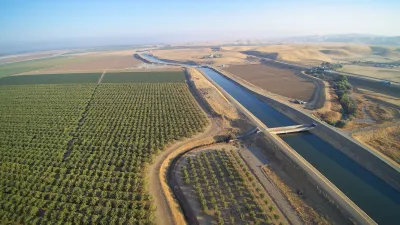Under a proposed 25-year solar contact, the Los Angeles Department of Water and Power would pay record-cheap prices for 400 megawatts of power. But the utility declined to approve the deal after a utility workers' union raised concerns.

"Under the 25-year contract with developer 8minute Solar Energy, the Los Angeles Department of Water and Power would pay less than 2 cents per kilowatt-hour — a number city officials and independent experts say would be the lowest price ever paid for solar power in the United States," Sammy Roth writes. In addition to 400 megawatts of solar capacity, the project would also include at least 200 megawatts of lithium-ion battery storage capacity so it can continue powering the grid after dark.
But LADWP's Board of Commissioners voted not to send the contract forward to the L.A. City Council after concerns were raised by the International Brotherhood of Electrical Workers Local 18, a utility employees' union. The exact nature of the union's objection was hard to pin down. The union has opposed parts of L.A. Mayor Eric Garcetti's Green New Deal initiative, including the retirement of three gas power plants that employed over 400 LADWP staff.
"LADWP staff struggled to explain to the Board of Commissioners Tuesday why Local 18 had objected to the Eland project," Roth writes. According to a spokesperson for the union, LADWP "has not complied with its contractual obligations for this deal." LADWP will reconsider the contract again at a September 10 board meeting.
FULL STORY: Los Angeles has lined up record-cheap solar power. But there’s a problem

Study: Maui’s Plan to Convert Vacation Rentals to Long-Term Housing Could Cause Nearly $1 Billion Economic Loss
The plan would reduce visitor accommodation by 25,% resulting in 1,900 jobs lost.

North Texas Transit Leaders Tout Benefits of TOD for Growing Region
At a summit focused on transit-oriented development, policymakers discussed how North Texas’ expanded light rail system can serve as a tool for economic growth.

Why Should We Subsidize Public Transportation?
Many public transit agencies face financial stress due to rising costs, declining fare revenue, and declining subsidies. Transit advocates must provide a strong business case for increasing public transit funding.

How to Make US Trains Faster
Changes to boarding platforms and a switch to electric trains could improve U.S. passenger rail service without the added cost of high-speed rail.

Columbia’s Revitalized ‘Loop’ Is a Hub for Local Entrepreneurs
A focus on small businesses is helping a commercial corridor in Columbia, Missouri thrive.

Invasive Insect Threatens Minnesota’s Ash Forests
The Emerald Ash Borer is a rapidly spreading invasive pest threatening Minnesota’s ash trees, and homeowners are encouraged to plant diverse replacement species, avoid moving ash firewood, and monitor for signs of infestation.
Urban Design for Planners 1: Software Tools
This six-course series explores essential urban design concepts using open source software and equips planners with the tools they need to participate fully in the urban design process.
Planning for Universal Design
Learn the tools for implementing Universal Design in planning regulations.
City of Santa Clarita
Ascent Environmental
Institute for Housing and Urban Development Studies (IHS)
City of Grandview
Harvard GSD Executive Education
Toledo-Lucas County Plan Commissions
Salt Lake City
NYU Wagner Graduate School of Public Service





























